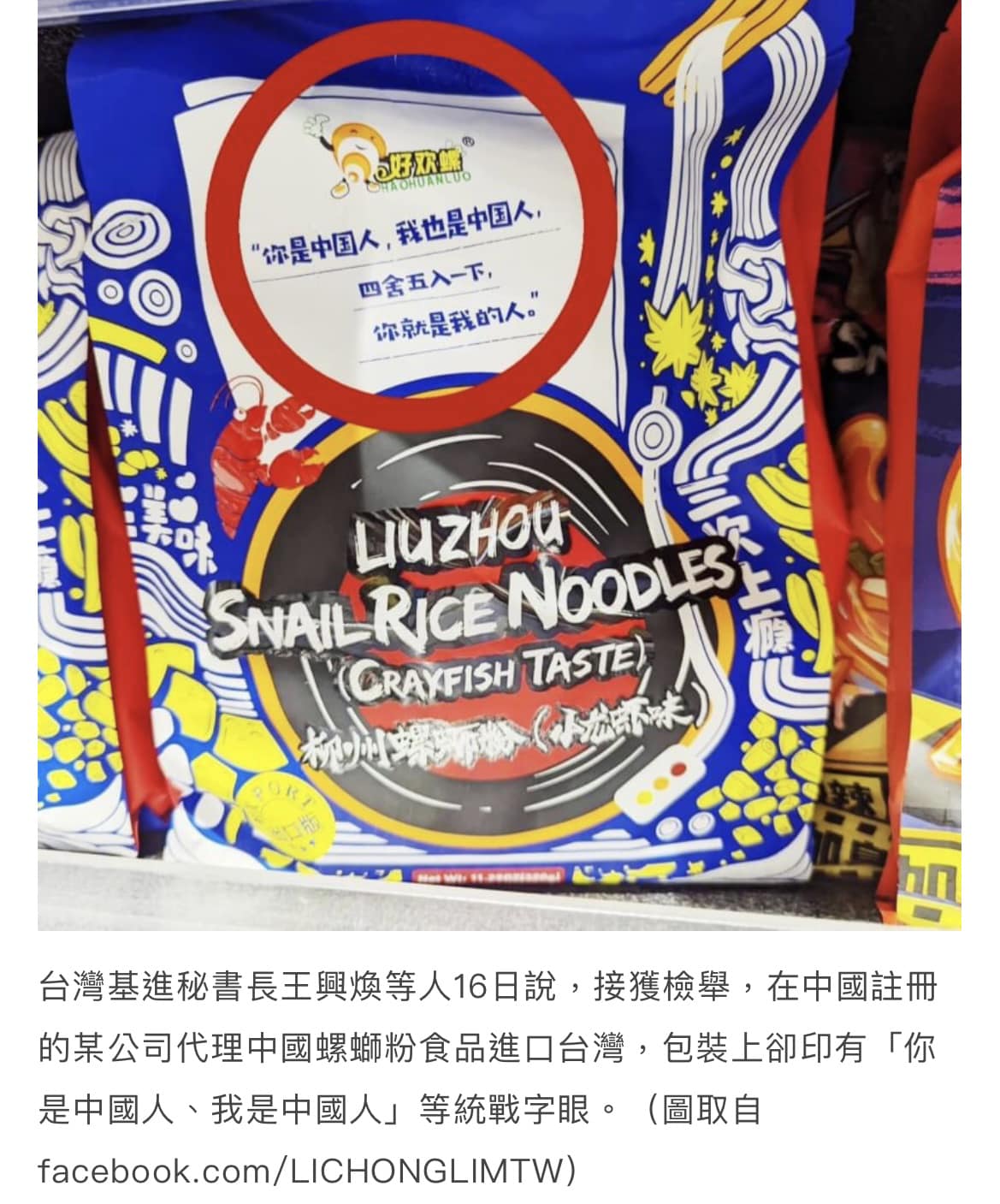Liuzhou Snail Rice Noodles
« previous post | next post »

Liuzhou Snail Rice Noodles from China. (Facebook, Li Chong-lim photo)
The photograph is from this article:
China’s ‘propaganda noodle soup’ ordered off the market in Taiwan
Noodle packaging has ‘You are Chinese, and I am too’ emblazoned across it
By Huang Tzu-ti, Taiwan News (1/17/23)
This really is blatant mainland propaganda on the island nation of Taiwan.
The writing in blue inside of the red circle reads:
Nǐ shì Zhōngguó rén, wǒ yěshì Zhōngguó rén, sìshěwǔrù yīxià, nǐ jiùshì wǒ de rén.
你是中国人,我也是中国人,四舍五入一下,你就是我的人。
"You're Chinese and I am Chinese too; round it up a bit and you are mine."
AntC asks: "Aside from the linguistic aspect of putting propaganda on noodle packs, I'm curious what 'Round it up and you are mine.' is trying to say. Eat them up?"
That may be how the Taiwanese feel in the face of such blatant aggrandizement, but the idea that the mainlanders want to get across is this, as explained by Zihan Guo:
I know this sentence makes awkward logical sense, but the central idea is that Taiwanese / Taiwan belong to Chinese / China. The political implication of this slogan is clear, given that it is a product from the mainland imported in Taiwan. The article also says that it is "part of Beijing’s unification propaganda."
If you are asking about the phrase sìshěwǔrù 四捨五入 ("round off to the nearest whole number"), I have recently, by accident, explained this to my parents. You have it right that it means to round it up. Sometimes it is used for real approximation, suggesting that two things can be treated as identical, like the wǔrù 五入 part in mathematic calculation. More often it is for comical exaggeration. For instance: Wǒ wàngle zuótiān chāoshì dǎzhé, sìshěwǔrù jiùshì sǔnshīle yīgè yì 我忘了昨天超市打折,四捨五入就是損失了一個億。[I forgot that there was a sale st the supermarket yesterday. Round it up, I lost 100 million.]
I figured that you would not like the idea of luósī fěn 螺螄粉 ("snail rice noodle") anyway.
I kept a pet grove snail named Arnold for five and a half years, so I would never dream of eating such a creature, and the idea of consuming escargots does not appeal to me either.
Selected articles
- "Chinglish medley" (2/9/16) — "Acid fry cowpea screw meat"
- "Alien encounters" (9/15/16) — see item 3 in this comment
Taylor, Philip said,
January 19, 2023 @ 9:07 am
I have to ask, did Arnold appear to respond when you called his name ?
Victor Mair said,
January 19, 2023 @ 9:22 am
Yes, and he raised his head to look at me one last time before he died. We had a very close relationship.
Taylor, Philip said,
January 19, 2023 @ 10:18 am
Very sad, Victor — I empathise with your loss. I feel somewhat better now about declining to participate in a family meal comprising around 10 000 tiny snails in Viet Nam at some point during the last 20 years (I elected to eat Primula cheese and baguette instead). …
AntC said,
January 19, 2023 @ 10:00 pm
Thank you Victor for the explanation.
Never mind doing unspeakable things to snails, what a waste of crayfish! Or is 'Crayfish Taste' some weaseling phraseology for: no actual crayfish?
So '四舍五入一下,你就是我的人。' is trying to say 'you and me both are all Chinese, near enough.' Inflammatory indeed.
DS Zhang said,
January 25, 2023 @ 9:12 pm
I agree with Zihan Guo that 四舍五入 is often used as an exaggerated comic in Chinese nowadays. This actually originates from a 梗 ("shtick"). In November 2014, a CCTV 1 TV show, one of the most famous Chinese TV hostess, Ni Ping 倪萍 said in front of the entire audience: "我们微博的阅读量是五千五百万,同志们,这是什么,四舍五入一下,将近一个亿呀! " (The number of readers to our Weibo micro-blogging account [of the CCTV State Media] is 55 million. What does this mean? Round it up it's almost 100 million!) This nearly blatant adulation to the newly-opened CCTV State Media blogging website from her mouth instantly became the source of mockery from Chinese audience and mockery. That's how, ever since, "sishe wuru yixia" 四舍五入一下 ("Round it up") became prevalently used in comic and quotidian contexts, such as in the example that Zihan gave, "I forgot that there was a sale at the supermarket yesterday; round it up and I lost 100 million!"
The "ni shi wo de ren" 你是我的人 ("you are my person") part is, of course, of political connotation because this is an imported good from mainland China to Taiwan. However, I doubt that this phrase is ONLY printed on those imported packages FOR Taiwan. 你是我的人 is a common flirtling phrase between boys and girls. It is also frequently used between two good girlfriends among young Chinese people, for a good joke-and-punch moment of friendship.
So I think that it would be interesting to see if the same phrase is printed in packages sold within mainland China too; if it is, then perhaps one would be less politically sensitive to the tongzhan 统战 ("United Front") side of it — a lame and greasy, somehow brainless advertisement simply once more.